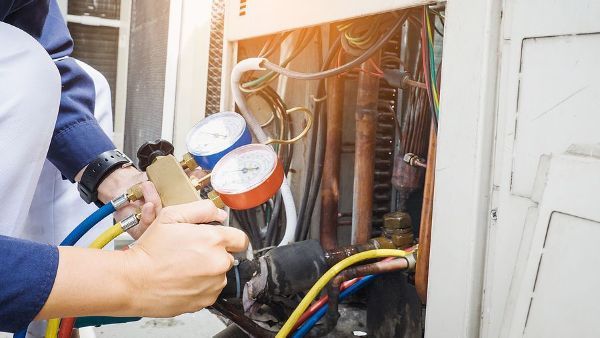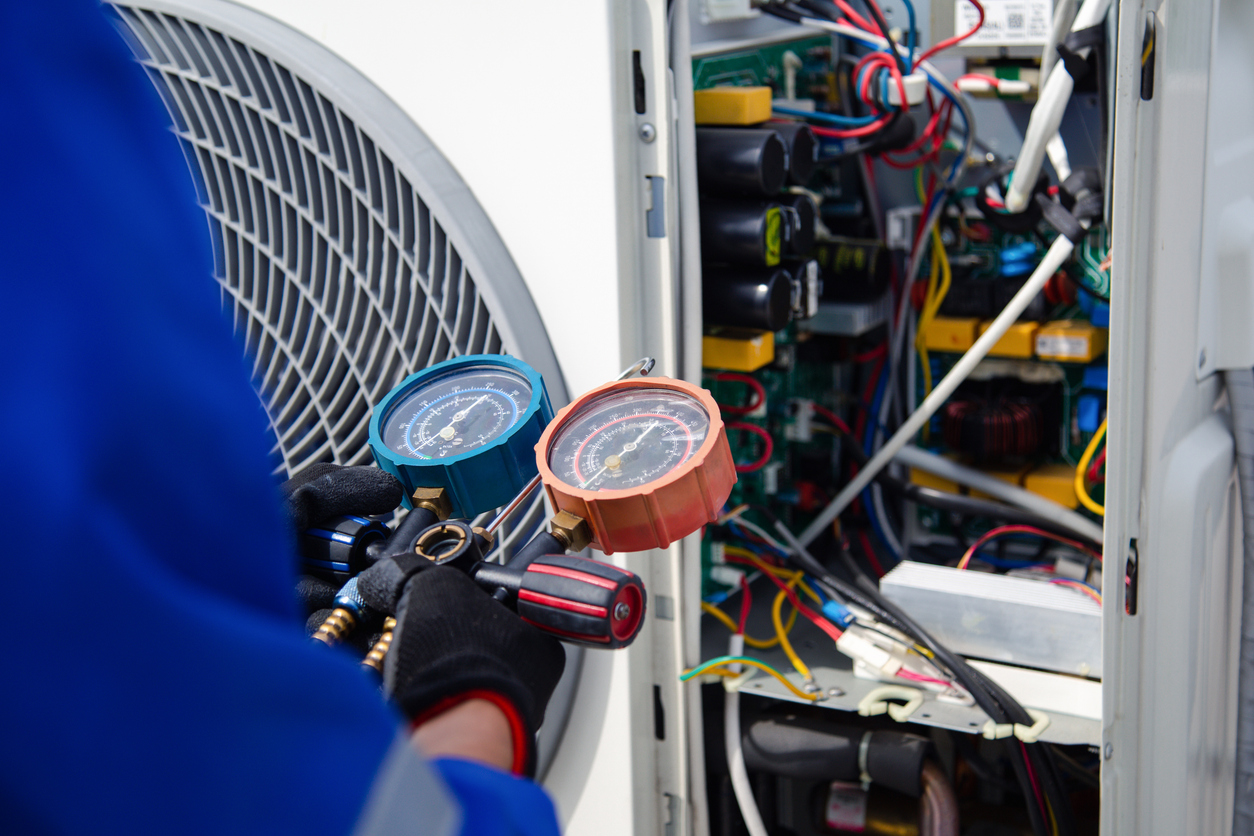AC repairman checklist: must-do inspections
Wiki Article
Everything about A/c: Identifying Common Issues and Effective A/c Repair Methods
A/c systems are essential for maintaining indoor comfort. Comprehending their parts and capability is important for recognizing common issues. Property owners commonly encounter troubles such as ineffective cooling, strange odors, or increasing energy costs. These indications can suggest underlying concerns that might call for focus. Discovering do it yourself troubleshooting strategies can be valuable, yet knowing when to look for professional help is equally important. What steps can be required to assure durable efficiency?Recognizing Your Cooling And Heating System: Elements and Capability
An a/c system, commonly taken into consideration the backbone of indoor climate control, contains a number of essential elements that interact to manage temperature and air quality. The key aspects include the home heating unit, air flow system, and air conditioning system. The heating device, normally a heating system or boiler, creates warmth throughout colder months, while the cooling unit cools down indoor rooms during the summer season.
Typical Heating And Cooling Problems Home Owners Encounter
Home owners frequently face numerous typical HVAC troubles, consisting of irregular temperature level distribution throughout their living spaces. Furthermore, unusual noises throughout procedure can show underlying issues that need interest. Dealing with these problems quickly is important for maintaining excellent system efficiency.Inconsistent Temperature Circulation
Lots of households experience the discouraging issue of inconsistent temperature level distribution, where particular rooms feel annoyingly warm while others stay too cool. This issue often emerges from a range of factors, consisting of poor insulation, obstructed vents, or an incorrectly sized HVAC system. When air ducts are not sufficiently sealed or when furnishings obstructs air flow, some rooms might receive inadequate air conditioning. Furthermore, thermostat positioning can significantly influence temperature level policy; a thermostat situated in a sunlit area might misstate the overall temperature level of your home. Routine upkeep, including cleansing filters and ensuring ductwork is clear, can help reduce these disparities. Property owners might additionally think about zoning systems to far better control temperatures throughout different areas of the home, promoting a much more comfortable living atmosphere.Unusual Sounds Throughout Operation
When an a/c system operates, uncommon sounds can indicate underlying problems that call for focus. Property owners may come across a variety of audios, such as grinding, squealing, or hissing. Grinding sounds usually signify damaged bearings or parts, while squealing can recommend loosened belts or parts needing lubrication. Hissing may show a cooling agent leakage, which can jeopardize the system's effectiveness. Furthermore, banging noises may point to loose ductwork or a concern with the blower follower. Each of these noises functions as a caution, motivating house owners to check out even more. Disregarding these indicators can bring about even more significant troubles and pricey fixings. Routine maintenance and punctual interest to unusual sounds can improve system longevity and efficiency, making sure a comfortable living setting.Indicators That Indicate Your A/c Needs Fixing
Exactly how can one tell if their cooling system is in need of repair service? Several indicators may show underlying concerns needing specialist focus. First, if the air conditioning falls short to cool the room efficiently, it might suggest a cooling agent leak or compressor breakdown. Furthermore, a rise in energy expenses without corresponding use adjustments might signal inadequacy in the system. House owners ought to also be sharp to unusual scents emanating from the unit, which might indicate mold and mildew growth or electrical concerns. If the Air conditioner often cycles on and off, it could be an indication of a damaged thermostat or other mechanical troubles. The existence of water merging around the system can suggest a clogged drainpipe line. Recognizing these indicators early can conserve time and money, making certain that the air conditioning system operates efficiently and successfully.Do It Yourself Troubleshooting Techniques for Heating And Cooling Issues
When encountering heating and cooling problems, property owners can use several do it yourself fixing strategies to recognize the issue. Secret techniques include checking thermostat settings, inspecting air filters, and assessing drainage issues. These actions can aid determine common malfunctions prior to seeking professional aid.Inspecting Thermostat Settings
What actions should house owners take to assure their thermostat settings are correct? They should validate the thermostat is established to the wanted temperature level and mode, whether heating or air conditioning. Looking for a clear display and validating the thermostat is not established to "hold" or "getaway" setting is essential. Home owners must likewise validate that the thermostat is level and mounted in a place devoid of drafts, straight sunlight, or other temperature affects. In addition, altering the thermostat can assist offer accurate readings. If the thermostat operates on batteries, replacing them might solve any type of problems. By systematically reviewing these variables, home owners can usually determine and correct thermostat-related problems, promoting optimal a/c system performance.Inspecting Air Filters
Air filters play a vital role in keeping optimal heating and cooling performance. They catch dust, allergens, and various other fragments, guaranteeing tidy air circulation. Over time, filters can come to be blocked, reducing air flow and efficiency. To inspect air filters, people ought to first find the filter, typically discovered in the return air duct or near the heater. AC repairman When situated, they must assess the filter's condition-- if it shows up unclean or discolored, it likely requirements substitute. A lot of filters require altering every 1-3 months, depending on usage and ecological aspects. Regular examination and timely replacement of air filters not just enhance air high quality yet also extend the life-span of a/c systems, preventing prospective breakdowns and pricey repairs.
Examining Water Drainage Issues
How can house owners properly identify and deal with drain concerns within their HVAC systems? First, they ought to check the condensate drainpipe line for obstructions or blockages, which can result in water build-up. Property owners may utilize a wet/dry vacuum cleaner to get rid of any kind of debris blocking the line. Next off, examining the drainpipe frying pan for corrosion or leakages is crucial, as a harmed frying pan can create water to overflow. Normal cleansing of the drainpipe line with a blend of vinegar and water assists protect against future blockages. In addition, making sure proper slope of the drainpipe line advertises effective water flow. If these DIY strategies do not resolve the problem, seeking advice from a specialist HVAC professional may be essential to prevent potential water damage and system failure.When to Call a Professional for A/c Fixings

While some AC issues can be dealt with via DIY approaches, there are scenarios where calling a specialist becomes vital. Home owners ought to look for experienced assistance when they experience relentless troubles, such as inadequate cooling, odd sounds, or unusual odors originating from the system. These signs and symptoms might indicate deeper issues that need specialized understanding and tools to diagnose and repair properly.

Preventative Upkeep Tips for Cooling And Heating Longevity
Routine preventative upkeep can substantially enhance the long life of heating and cooling systems. House owners need to schedule annual assessments by qualified service technicians to analyze system efficiency and identify potential problems. Consistently changing or cleaning up air filters is vital, as this guarantees correct airflow and decreases pressure on the system. Furthermore, checking and sealing ductwork avoids energy loss and improves overall performance.
It is also advisable to keep the outdoor device free from particles and plants, permitting peak air movement and warm exchange. House owners ought to check the condensate drain for blockages to avoid water damages and mold and mildew growth. Keeping proper thermostat settings and utilizing programmable alternatives can enhance energy efficiency. Documenting upkeep activities assists track service background and can help in recognizing reoccuring concerns. By adhering to these preventative measures, people can take full advantage of the effectiveness and life-span of their cooling and heating systems
Frequently Asked Questions
How Typically Should I Replace My Heating And Cooling System Filters?
A/c system filters must commonly be changed each to 3 months, depending upon use, filter type, and environmental aspects. Routine replacement assists maintain efficiency and air top quality, making sure peak system performance throughout the year.What Dimension A/c System Do I Need for My Home?
To establish the suitable heating and cooling system dimension for a home, one need to consider square footage, insulation high quality, and local climate. Consulting an expert can assist guarantee maximum effectiveness and comfort for the specific living space.Are There Eco-Friendly HVAC Options Available?
Yes, environmentally friendly a/c alternatives are offered, including energy-efficient warmth pumps, solar-powered systems, and geothermal heating. These options decrease energy consumption and environmental effect, promoting sustainability while preserving efficient climate control for domestic and commercial spaces.Exactly How Can I Enhance My HVAC System's Energy Performance?
To boost cooling and heating energy effectiveness, one can frequently maintain the system, seal air leakages, set up programmable thermostats, utilize energy-efficient filters, and warranty adequate insulation throughout the home to decrease power usage and enhance efficiency.
What Is the Ordinary Lifespan of a Heating And Cooling System?
The typical life-span of a HVAC system normally ranges from 15 to 25 years, depending on elements such as upkeep, usage, and the quality of setup. Routine upkeep can considerably expand its functional long life.Verdict
In recap, a comprehensive understanding of heating and cooling systems equips house owners to recognize typical issues and address small troubles properly. Identifying indicators of breakdown, utilizing DIY fixing techniques, and focusing on normal upkeep can improve system performance and efficiency. However, when confronted with complex repair work, employing professional help is crucial to guarantee safety and security and long life. By fostering understanding and aggressive treatment, individuals can enjoy a comfortable interior atmosphere while minimizing unanticipated expenses related to cooling and heating failings.Report this wiki page